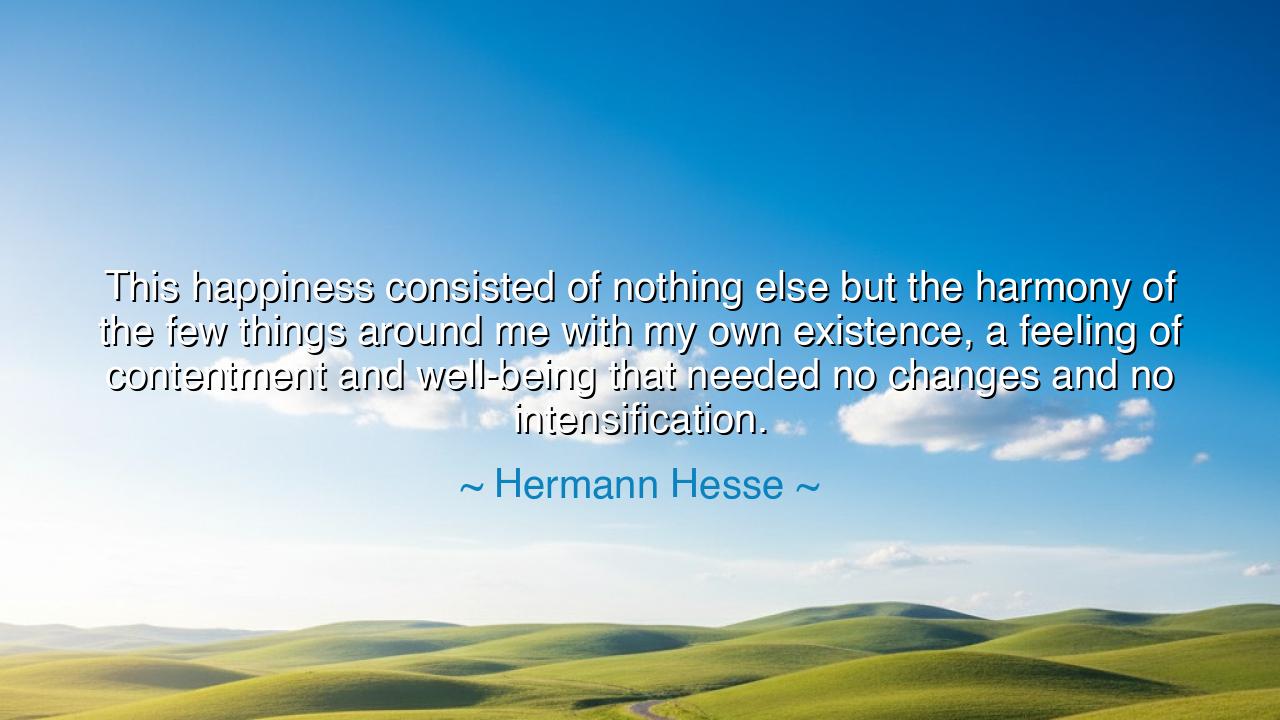
This happiness consisted of nothing else but the harmony of the
This happiness consisted of nothing else but the harmony of the few things around me with my own existence, a feeling of contentment and well-being that needed no changes and no intensification.






The poet and mystic Hermann Hesse, whose words flowed like the calm current of a hidden river, once wrote: “This happiness consisted of nothing else but the harmony of the few things around me with my own existence, a feeling of contentment and well-being that needed no changes and no intensification.” In this quiet yet profound declaration, Hesse unveils the eternal secret of joy—a truth that eludes those who chase it through wealth, fame, or desire. He tells us that happiness is not found in conquest or abundance, but in the rare stillness when one’s soul stands in harmony with the world. It is not something that can be bought, amplified, or pursued—it is the simple peace of being at one with life as it is.
The origin of these words can be traced to the reflective depths of Hesse’s life, a man who often walked between solitude and self-discovery. Through works like Siddhartha and Steppenwolf, he explored the restless hunger of the human spirit and its yearning for meaning beyond material satisfaction. Hesse himself retreated from the noise of modern civilization to live close to nature, to read, to paint, and to meditate. It was in these moments—away from the machinery of ambition—that he found this state of happiness, not in grand experiences, but in the quiet alignment of his inner being with the simple world around him. To feel content, he discovered, was not to escape life’s imperfection, but to accept it fully, as a musician accepts each note of a song as necessary to its beauty.
What Hesse describes is a happiness untouched by the fever of modern longing—the kind of peace the ancients called ataraxia, the serenity of the soul that has ceased to war against itself. To feel harmony with one’s surroundings is to see no boundary between self and world, to recognize that the wind, the light, the silence, and the breath are not separate from one’s own existence. In such moments, the heart no longer cries out for “more,” for it understands that all is already enough. Contentment, Hesse teaches, is not a lesser state of joy—it is joy purified of excess, a fire that burns without consuming.
Consider the example of Diogenes, the philosopher of ancient Greece, who lived in a simple barrel and owned almost nothing. When Alexander the Great came to visit him and offered to grant any wish, Diogenes merely said, “Stand out of my sunlight.” The conqueror of nations stood in awe before a man richer in peace than he could ever be in power. Diogenes, like Hesse, understood that well-being is not achieved by addition, but by subtraction—by removing the weight of desire until one stands bare and whole in the present moment. This is the harmony Hesse speaks of: when the external world, however small, perfectly mirrors the calm within.
Yet, the path to such happiness is not easy. It requires courage to turn away from the false promises of the world—the endless chase for novelty, for more possessions, more recognition, more stimulation. The mind trained by modernity believes that joy must always be heightened, intensified, or transformed. But Hesse’s wisdom cuts through this illusion: true well-being is fragile precisely because it asks for nothing. It is born when the heart grows still enough to hear the soft rhythm of life itself—the whisper of the trees, the warmth of sunlight on the skin, the gentle hum of one’s own breath. To dwell in such peace is to be free.
Hesse’s insight also carries a moral beauty. When one finds contentment in simplicity, one ceases to harm, to exploit, or to consume beyond need. The soul that is satisfied with “the few things around” becomes a friend to the earth, a guardian rather than a taker. The ancient sages knew this well. The Taoist Lao Tzu wrote, “He who knows that enough is enough will always have enough.” The same spirit moves in Hesse’s words: that the richest life is the one lived with gentle gratitude, in rhythm with the quiet music of existence. Such a life does not crave greatness; it creates it silently through peace.
So, my child, remember this teaching. Do not seek happiness in distant lands or in the fleeting applause of others. Look instead to the harmony between your inner and outer worlds. Walk slowly; breathe deeply; cherish the simple things—a meal shared, a morning breeze, a moment of silence before sleep. Let your consciousness be lively but untroubled, like sunlight dancing on water. When you cease to demand that life be different, you will find that it overflows with beauty.
Thus, the words of Hermann Hesse endure as both comfort and command: that true happiness is not the possession of pleasure, but the alignment of soul and world; that the highest joy is not intensity, but contentment; not conquest, but harmony. And when the few things around you—your thoughts, your breath, your surroundings—move in rhythm with your own existence, then you shall know the secret that all wise hearts have whispered since time began: that peace, once found within, transforms everything without.






AAdministratorAdministrator
Welcome, honored guests. Please leave a comment, we will respond soon